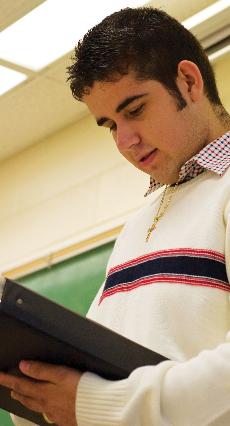New citizen new voter

Arturo Lechuga takes attendance during a recent 8 a.m. MIDS100 class. The newly minted U.S. citizen has registered to vote and is looking forward to taking part in the in the political process.
First-time voter Arturo Lechuga registered to vote this August on the day he received his citizenship.
“It was a really neat ceremony,” said Lechuga, junior accounting and finance major. “The judge set up some rules, [he said] if you want to take a picture of me you have to promise me you have to register to vote.”
Lechuga registered right after the swearing-in ceremony.
Lechuga was born in Mexico. His father worked in the United States and two of his sisters were born here. In 1993, when he was five-years-old, his father filed paperwork so the family could join him in Joplin. October 28 marks the nine-year anniversary of Lechuga’s arrival in the U.S. as a permanent resident.
He spent his childhood under the shadow of the mountains in the Mexican state of Durango. Sixty houses lined the dusty roads of his hometown of Palestina. Lechuga estimates the total population as 110 people. He knew everyone in town and if they passed someone on the street people always waved.
“We had two teachers at my elementary school,” Lechuga said. “One would teach first through third grade and the other from fourth to sixth.”
He attended school in the mornings and helped with the farm in the afternoon. They raised wheat, corn and beans. Lechuga milked the cows. When he was 12-years-old, the family moved. The change from his rural village to Joplin was dramatic.
“I did not know any English and that made it very hard at the beginning. I did not even know the colors to be honest,” he said. “It was very sad at first.”
But he learned. Lechuga says he was not very social as a high school student because of the language barrier, but that changed when he came to Missouri Southern. He was a freshman orientation leader and now is the student assistant for a MIDS100 class.
ESL classes helped him learn English ad teaching has given him confidence.
He has three goals for the future: a master’s degree, teach part time and a professional job in one of his double majors – finance or accounting.
“Right now I work as a part-time staff accountant at and I’m really enjoying that. But maybe I want to go into corporate finance,” Lechuga said. “My mind keeps changing, but it will be something with my majors I am going to get.”
Lechuga is an honor student, secretary for both the Accounting and Investment clubs, a member of Delta Epsilon Chi, Student Senate EMS and four honors societies
He applied for citizenship at the beginning of the year and after being fingerprinted, interviewed, taking his citizenship test he attended his swearing-in ceremony in Kansas City on Aug. 21.
Lechuga is enthusiastic about his chance to have a say in the politics of his adopted country.
“I think its’ a big deal because you get to add a little of you to the outcome of the election. Your voice is heard,” he said. “Many people tell me it’s only one vote, but if we think that one vote is not important then no one would be voting.
“You know, to me, it’s a great deal that I’m going to be voting the first time in my life to elect the president of the United States.”
Lechuga describes himself as an undecided moderate split by issues on both sides of the aisle.
“I think voting in the election is very difficult and you have to look at the up the ups and downs of each one,” he said. “Honestly I don’t have one [a candidate] yet.”
Conservative values, the economy and less government involvement are all important issues for Lechuga, but immigration may be his deciding point.
“I think it has to be a great very sad to be an illegal immigrant,” Lechuga said. “I understand that many Americans may say so ‘they don’t pay taxes,’ or ‘they came illegally’ … Some people try to apply to come legally to the United states, but sometimes the government does not allow them to.”
He feels for immigrants caught with a legal status in limbo between two cultures. They cannot return, but they cannot stay unless they are granted amnesty.
“I know a lot of people who have left Mexico and they have never come back – they can’t go back because if they do they can’t come back here to the United States where they have their lives.”
Your donation will support the student journalists of Missouri Southern State University. Your contribution will allow us to purchase equipment and cover our annual website hosting costs.



























